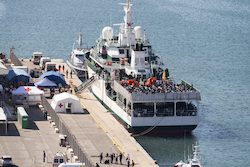Revolutionising conflict prevention and crisis management
Under the Lisbon Treaty, the EU aims to “promote peace, its values and the well-being of its peoples” and to “preserve peace, prevent conflicts and strengthen international security”. However, peacekeeping missions are not always so easy to implement, as they often come with an array of complex organisational and management challenges. For example, high rotation of staff often leads to loss of information, which can affect overall effectiveness. The EU-funded IECEU project is identifying the problem areas, finding best practice examples and then developing new solutions, like improved training and education programmes. “We must work in order to ensure better competences of the personnel working in crisis and conflict regions through professional training, as well putting efforts into technologies for the Common Security and Defence Policy (CSDP),” said project coordinator Kirsi Hyttinen, of the Laurea University of Applied Sciences, Finland. Of course, crisis management and conflict resolution missions do not represent the typical workplace. “The personnel to be deployed to crisis and conflict regions will face totally new issues compared to [what they face] on a daily basis in their home country,” said Hyttinen. IECEU developed an online learning tool(opens in new window), which is designed to help new staff prepare for working in these potentially hostile environments. It uses a range of animations, videos and games to educate members of the public about the activities of the EU’s Common Security and Defence Policy, and provides a much-needed resource for those venturing into the field for the first time. The course showcases eight ‘case studies’ of various conflicts around the world, and introduces the learner to the backstories of said conflicts and the role of EU peacekeeping forces to resolve them. Local involvement Operators deployed on peacekeeping missions often spend a relatively short time at one location before being sent to another. They may leave a site before meeting incoming colleagues, resulting in a lack of information flow between staff. Increased cooperation with local people resolved this problem and improved overall effectiveness, the researchers found. They recommended involving locals early, in the planning phases of a mission. The researchers also found ways to optimise the use and interoperability of resources in crisis management and peacebuilding, and assessed the potential for pooling and sharing EU technologies. Integrating lessons learned One issue that the researchers discovered was that missions are often planned and executed without taking into account lessons learned from previous operations. They recommended further integrating this knowledge into the planning processes for new missions. Standardisation was deemed to be key for ensuring civilian safety during peacekeeping missions, however the IECEU equally highlighted the importance of flexibility to adapt to rapidly changing environments, and simplicity to deal with basic conditions and low levels of resources. Standardisation of EU crisis management operations, training and exercise systems, capabilities, equipment and support platforms would support these processes. According to Hyttinen, this kind of research is vital to ensure the continued protection of EU citizens and, more widely, the global population. “The enhancement of EU external security and conflict prevention capabilities benefits the EU and its citizens as well as entire global society towards a safer world,” she said. Soft skills and competences were analysed as the cornerstone of success of civilian missions carried out under the EU’s Common Security and Defence Policy. The education and training tools will provide a much-needed resource to civilians and military personnel alike in a cost-efficient way, and although it will take time to implement the other recommendations of IECEU, the outlook looks bright for a renewed and improved approach to the EU’s crisis management and conflict resolution.







